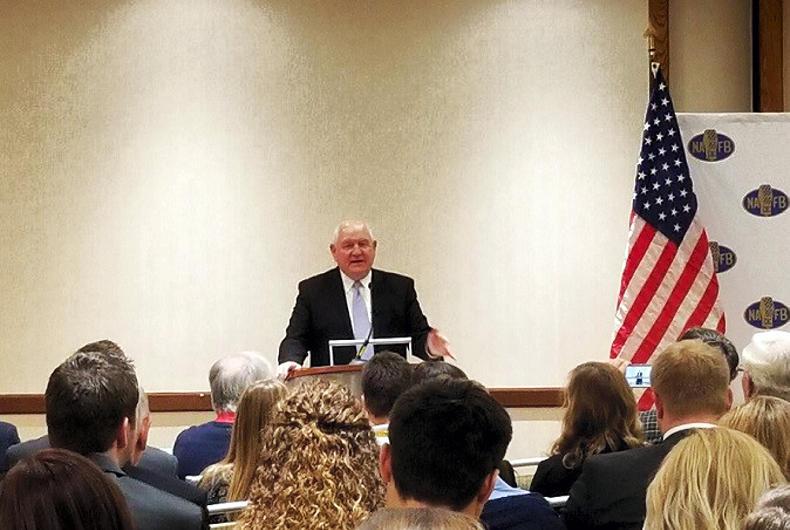In recent weeks, the US National Association of Farm Broadcasters (NAFB) held its 74th annual convention in Kansas city. Stephen Robb attended on behalf of the IFJ.
USDA Secretary of Agriculture, Sonny Perdue, was in attendance. He addressed those assembled and answered questions from the press. He was not complementary about the food controls and legislation operating in the EU.
Sonny Perdue became the 31st US Secretary of Agriculture last April at the age of 70. He sees trade, farm labour and regulations as the top three issues facing US farmers and he aims to help tackle all three.
His address to the NAFB coincided with the release of the November USDA crop production report, which confirmed a 2% increase, month on month, in the expected national corn output to 14.6 billion bushels – but this is still 4% lower than last year. Soya bean production was largely unchanged month on month.
Output needs a home
Asked about the unexpectedly large corn crop in the US this year, he commented that one of the biggest challenges now is to find a home for all of this.
As crop genetics continue to add significant yield potential, it is essential that a home is found for this increased corn and soya bean output, he said. One of the big challenges in this regard is to preserve the home market in the face of the NAFTA (North American Free Trade Agreement) negotiations. He suggested that these negotiations may go to the brink but he believes that a new and better agreement will result.
Asked if he thought that the recent rhetoric coming from President Trump had damaged these talks, Mr Perdue answered that he did not expect so. All negotiations are tough and this one is no different. “You have to be willing to walk away in order to make progress”, he stated.
That said, the secretary indicated that he felt it important to have a contingency plan should the NAFTA negotiations fail. He emphasised the importance of being well prepared for negotiations but also the importance of having a “plan B” in place should there be a need to walk away. “It’s a bit like being in the boy scouts,” he said.
Future trading agreements
Asked if future agricultural trade agreements are more likely to be bilateral rather than multilateral, Secretary Perdue commented: “I think they are more likely to be bilateral during this administration.”
He believes that better agreements can be negotiated on a one-to-one basis, rather than for a group such as TTP or TTIP.
He had little hesitation in declaring his frustration with the EU and its protectionism. He said that they hide behind a lot of things such as food safety, GMOs and all kinds of other issues, which he reckons is nothing more than a cloud of protectionism. It is particularly frustrating when individual ministers speak the right language in private and want to do deals but then they run back under the EU umbrella to prevent progress, he commented.
New trade deal with China
Asked for his opinion about the recent announcement that $700m worth of US beef is to be sold to China, the secretary commented that: “The Chinese love US products. People there are convinced that US food is very safe but trade is a matter of getting past governmental regulations.”
He believes that E-commerce is going to be highly influential in all markets and that it will enable more smaller packers and producers to be directly engaged in that part of the global market.
Deregulation
The secretary said regulations that hinder farming productivity will be addressed in this administration. So deregulation is one of the main objectives of this government, he stated.
He went on to say that the President is committed to peeling away these regulations one at a time. The President has put forward an executive order that for every regulation put in place, administrators must remove two.
“It is as difficult to get a regulation undone in congress as it is to get a new one passed,” he stated. However, he expects to have several of the regulations that are regarded as hindering agriculture removed by next autumn.
Brexit and UK trade deal
Asked to comment on the potential for a trade deal between the Trump administration and the UK following Brexit, the secretary said that they would be open for a trade deal of some kind between the UK and the US post-Brexit.
However, he said that any discussion on this would be premature for the moment as the UK has a lot of challenges right now with Brexit. Their ongoing negotiations with the EU are more serious in terms of how they negotiate that exit.
When those negotiations are complete, they can then focus on discussions with us, he said. However, he said that he also found some UK leaders to be more concerned about how their controls would relate to EU rules rather than to US rules, so there may be a long way to go for such a deal.
Still, there may be more things in common with the US than not. The secretary commented that the UK trade representative, Liam Fox, spoke about some of the very same things that were issues for him. The use of science is the only way to ascertain a product’s safety but then this needs to be well communicated.
When the market is allowed to provide the choice, the consumer will decide on what is acceptable or not. Consumers are smart enough to make that choice, providing the label is honest, he stated.






 This is a subscriber-only article
This is a subscriber-only article










SHARING OPTIONS: